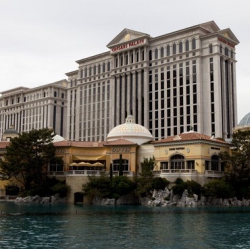
Blackstone Group and GPO Capital agreed to back the plan, setting the table for a January 2017 trial.
Caesars Entertainment Operating Company (CEOC), a subdivision of the Caesars Entertainment Corp, resolved its outstanding issues with its lenders on Friday. The resolution to the dispute leaves open the door for the CEOC to move ahead with a restructuring plan under a Chapter 11 bankruptcy file.
In January 2015, CEOC filed for Chapter 11 bankruptcy protection. At the same time, it submitted a reorganization plan which had the backing of the first lienholders, who own about 80% of CEOC’s debt. The junior creditors, who collectively owned about 20% of CEOC’s $18 billion in debt, sued to keep the reorganization plan from moving forward.
Bankruptcy Lawsuit
Since that time, the two sides have been locked in a bitter court battle. The junior creditors argued that Caesars Entertainment robbed CEOC of 12 key assets (resort-casinos) just months prior to filing for bankruptcy, then saddled the operations division with about half of the $18 billion in debt — and few assets to show for it.
Those troublesome negotiations continued through several phases of the bankruptcy case, in which several outside parties ruled that Caesars Entertainment would need to pay the junior creditors to end the dispute. One auditor suggested the lenders might receive $5.1 billion in a bankruptcy ruling.
Blackstone Group and GSO Holdings
Recently, things turned darker for CEOC, when a group of key lenders set a deadline for a bailout. The deadline set by Blackstone Group and GSO Capital Partners was December 24th. That date was set after Caesars failed to submit documents verifying to the creditors the market value of assets in CECO after the split of the division into two separate divisions.
With the lenders behind the reorganization plan, CEC and CEOC can proceed into the January 2017 bankruptcy trial with solid backing for the time being. Had the dispute with lenders continued, Caesars Entertainment Corp itself faced the danger of filing for Chapter 11 bankruptcy.
US Trustee Program Ruling
Caesars still faces financial difficulties, even with the lender dispute behind it. The US Trustee Program, which oversees corporate bankruptcies, recently said it might appeal the case to a higher authority, even if next month’s bankruptcy court approved the bankrupty process.
The US Trustee Program said that TPG Capital Management and Apollo Global Management may be evading as much as $5.1 billion in payments to the junior creditors. TPG Capital Management and Apollo Global Management are the holding companies which hold a controlling interest in Caesars Entertainment Company.
Leveraged Buyout of Harrah’s Entertainment
It was the leveraged buyout of Caesars Entertainment (then called Harrah’s Entertainment) by Apollo Global Management and TPG Capital Management in January 2008 which saddled the Las Vegas casino company with so much debt. Apollo and TPG bought control just months before the real estate and banking crisis of 2008, so the company had roughly $30 billion in debt going into the Global Recession.
With so much debt, it was a minor financial miracle that former Caesars CEO Gary Loveman was able to keep America’s largest single owner of casinos from entering bankruptcy. Through selling assets and buying down debt, the $30 billion eventually was lowered to $23 billion by 2015. Despite its efforts, the company was unable to gain full control of the situation, which is why CEOC declared bankruptcy in January 2015.
Closure and Sale of Valuable Caesars Properties
Since then, Caesars has closed properties in Atlantic City and Tunica. It also sold the successful Caesars Interactive, owner of Playtika, to a Chinese firm for $4.1 billion. The question still remains whether the many financial moves are going to allow Caesars to arrange a bankruptcy plan which can meet the approval of US bankruptcy Judge Benjamin Goldgar.
